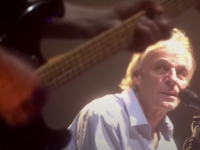For many of the most familiar names in blues music, their careers began in the church: Stars like B.B. King, Etta James and James Brown debuted as youngsters performing gospel music. For Lurrie Bell, the journey went in reverse.
The Chicago-born son of celebrated harmonica player Carey Bell, Lurrie’s youth was surrounded by visitors like Muddy Waters, Big Walter Horton and Eddie Clearwater. He knew the blues before he knew his ABCs. By the age of six, he had picked up a stray guitar and taught himself to pick out some sounds. It was only later, while living for a time in the Deep South with his grandfather — who was a country preacher — that the younger Bell became immersed in spirituals.
Of course, these two idioms have coexisted for decades in an uneasy truce — life-long neighbors who sit on either side of a seemingly impassable divide. But Bell, having always known one and grown to so deeply love another, sees no problem in marrying them — as illustrated on his superlative new release The Devil Ain’t Go No Music, due April 17 from Aria B.G. Records. The title track, written by producer Matthew Skoller, speaks to the blues’ oft-used negative sobriquet as “the devil’s music,” and perfectly sums up the project’s theme: Asked about it in a radio interview, Mavis Staples boldly asserted: “The devil ain’t got no music!”
Indeed.
Recording with a terrific amalgam of shared experience, including Billy Branch, Kenny “Beedy Eyes” Smith, Bill Sims Jr. and Joe Louis Walker, Bell has fashioned a majestic melding of praise music and easy-rocking soul, plucking tracks that are both bone-deep familiar (“Swing Low,” “Peace in the Valley”) and intriguingly contemporary (the new title track, written by producer Matthew Skoller; and “I’ll Get to Heaven on My Own,” from Walker’s 1989 project Blue Soul). In this open-hearted atmosphere, Muddy Waters’ “Why Don’t You Live So God Can Use You” and the Rev. Gary Davis’ “Death Don’t Have No Mercy” fit in snugly with tracks like Tom Waits’ “Way Down in the Hole” and James Taylor’s “Lo and Behold.”
Bell sits at the center of it all, often performing in small-group settings. But when the others step in, they make bold and memorable contributions: Walker offers an enervated slide moan to “Peace in the Valley,” then leaps up from the back pew to testify behind Bell on “I’ll Get To Heaven.” Smith’s chain-gang rhythm provides a stark underpinning to “It’s a Blessing.” Sims adds these rustic touches throughout, clapping his hands on “Swing Low” and “I’ll Get to Heaven,” then adding a churchy background vocal to “Lo and Behold.” Branch howls away on the harp on one of the rare full-band performances, a take on the traditional tune “Trouble in My way.”
[amazon_enhanced asin=”B0075MFS26″ container=”” container_class=”” price=”All” background_color=”FFFFFF” link_color=”000000″ text_color=”0000FF” /] [amazon_enhanced asin=”B00000AF5N” container=”” container_class=”” price=”All” background_color=”FFFFFF” link_color=”000000″ text_color=”0000FF” /] [amazon_enhanced asin=”B000XSLW0Q” container=”” container_class=”” price=”All” background_color=”FFFFFF” link_color=”000000″ text_color=”0000FF” /] [amazon_enhanced asin=”B000004BLF” container=”” container_class=”” price=”All” background_color=”FFFFFF” link_color=”000000″ text_color=”0000FF” /] [amazon_enhanced asin=”B000004BM0″ container=”” container_class=”” price=”All” background_color=”FFFFFF” link_color=”000000″ text_color=”0000FF” /]
- Nick DeRiso’s Best of 2015 (Rock + Pop): Death Cab for Cutie, Joe Jackson, Toto + Others - January 18, 2016
- Nick DeRiso’s Best of 2015 (Blues, Jazz + R&B): Boz Scaggs, Gavin Harrison, Alabama Shakes - January 10, 2016
- Nick DeRiso’s Best of 2015 (Reissues + Live): John Oates, Led Zeppelin, Yes, Faces + others - January 7, 2016


